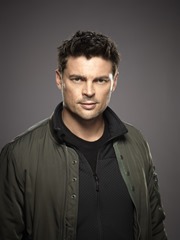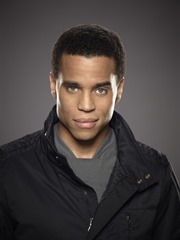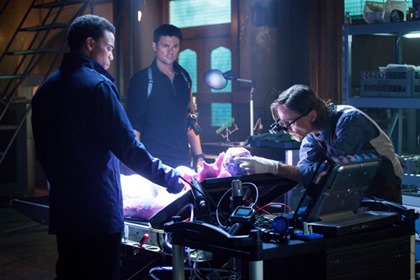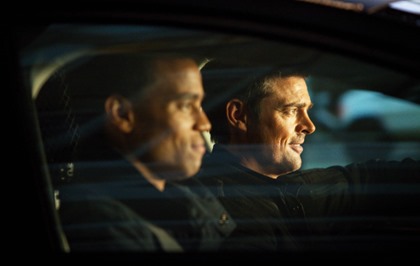The idea of teaming a human cop with a robot/android partner isn’t new; there have been a couple of high profile attempts in the past: Mann and Machine on the drama side, and Holmes & Yoyo on the comedy side just off the top of my head. Fox’s Almost Human (Sunday, 8/7C)then Mondays, 8/7C) is, to my mind, not only the best of this unusual sub-genre, it’s one of the best new shows of the Fall 2013 season.
Three of the biggest reasons are the excellent writing and the presence of Karl Urban and Michael Ealy as the human/android partnership. Urban and Ealy recently talked with a group of journalists/bloggers about the show.
Can you just talk a bit about kind of how you prepared for these roles?
Karl Urban: The preparation for me was a multi-level process. It involved a lot of discussion with Joel Wyman, J. J. Abrams, Bryan Burk. When it got on the ground here in Vancouver we started shooting. We had a bunch of tactical training. I went on a bunch of ride-alongs with some cops just to get a sort of feel of what the reality is of their job.
Then there’s also a physical component. Our show is a fun, action-packed hour of television. Michael and I both need to be in good shape to do our jobs. We pay a lot of focus, time and attention to keeping ourselves in good shape.
Michael Ealy: Basically kind of a similar situation in which I’ve spent a lot of time talking to Joel Wyman. As I said before, I try to model my version of synthetic droid or Dorian, in this particular case, after three particular characters in film. That’s “Jason Bourne,” the “Terminator 2” Robert Patrick’s version and “Starman,” played by Jeff Bridges. Those are all three movies that I kind of watched over and over again to try and find a good, strong foundation for Dorian.
I have to say first that this was one of my favorite pilots that I watched over the summer. I loved everything about it, the setup, the characters, the storylines, the acting and I’m so excited for everyone else to finally be able to see it.
Urban: Awesome. We are so blessed that you really enjoyed it. That’s awesome.
This is a question for both of you. What’s the hardest part of this show for you guys, as actors? Like for Michael I would imagine it’s the having to act like a robot that’s acting like a human.
Ealy: I think originally it started out that that was probably the hardest part for me; to try and absorb the idea that a machine is being human or a machine is trying to act human. That was definitely difficult at the start. I’m starting to get the hang of that now.
So I think right now the hardest part is actually trying to understand and develop somewhat of a bible for the world that we live in. You know what I mean. So it’s like, can you talk on the phone or do you talk through your com? Sometimes I can get a call from Mackenzie’s character, Rudy, and Karl can’t hear it and sometimes he can.
So it’s like we’re trying to find out what are the rules of the world that we set up. I think that’s probably the hardest part for me right now.
Urban: For me, one of the aspects that I find most challenging, I think, is the physicality of it. As I said before, this is a real fun, action-packed show. When you are attempting to achieve the quality of action and sort of the engaging performance that we are on a weekly basis, it certainly takes its toll.
We shot an absolutely amazing sequence last week where—it’s a little bit of a spoiler—Michael was fighting with another robot. I was fighting with another cop. It was absolutely amazing, but I tell you, the next day both of us couldn’t move. And of course you don’t have a day off. You’ve got to get back to work and do it all again the next day. So I think there’s a certain physical aspect of doing this show that I’m definitely finding a challenge.
I really loved the pilot. Thanks so much for your work. How far are you in shooting the season? You haven’t finished yet.
Urban: No, we are I think just about to start shooting episode eight.
So for each of you what is it that you most love about your roles and then also about the show?
Urban: Many things. I guess what I most love about Kennex is firstly his temperament. Often, you know, he can be kind of prickly on the surface but as we get to spend more time with him in the show we get to see a real softer side to him. I particularly like his relationship with Dorian.
At first, as you see in the pilot, Kennex is pretty adverse to accepting robots, robot technology, but the wonderful thing is that he forms this incredible bond with Dorian and he really comes to accept and see the value and the special unique qualities that this robot has. For me that’s such an endearing evolution in the character. I think that’s been one of my most favorite aspects of portraying Kennex.
Ealy: I think for me one of the things I like the most about Dorian is his sincerity and his—we’ve had some episodes where he’s kind of come to this conclusion that there’s an automatic protocol. When, for lack of a better term, the … hits the fan he has like an automatic protocol that takes over and he has to do things that are—he has to sacrifice himself in a lot ways.
That’s something I didn’t see coming when I signed for the role. It’s been kind of interesting to watch that unfold. And at the same time his humanity and what he can learn from Kennex, it’s just interesting to see somebody learn about friendship or learn about death from another human being. The themes of the show are defining what humanity is for us in this world.
My question is for both of you. Karl, maybe you can start. Obviously you guys have both had a lot of success in film the past couple of years. What attracted you to doing a television series and this series in particular?
Urban: For me it was a multitude of things. Firstly, it was my relationship with J. J. Abrams and Bryan Burk. I had a fantastic time working with them on Star Trek. When they approached me with this material I read the pilot and was immediately drawn to the characters, the dynamic between the characters and the world. It seemed to me that what they were endeavoring to achieve was a fun, action-packed kind of buddy cop show and do it in a way that, I think, hadn’t quite been done before. So that really peaked my interest.
From there I spoke to Joel Wyman, who was the creative genius behind Fringe. I have to say I made an instant connection with Joel. He’s a fun, smart creator. I was completely impressed with his vision for this world, these characters and the limitless possibilities of where we could take it. I felt like I would be kicking myself if I turned this down. So that’s really kind of what drew me to the project.
Ealy: For me, it started with that pilot script, which changed multiple times by the time we actually shot it, but each time it got better and better. From the first read I was just highly impressed with this world, this level of writing. It never hurts to associate yourself with the J. J. Abrams camp. That definitely didn’t hurt, but at the end of the day, for me, the opportunity to play a character like Dorian doesn’t come along very often.
To be honest with you, I’m not the biggest sci-fi guy. So I can’t say I honestly ever thought about playing a machine. At some point I thought about being a vampire and that was probably in “Underworld” when I was trying to become immortal. I never thought about immortality, so to speak, by being a machine. It’s an interesting concept for me and I’m still trying to wrap my head around it.
Was there anything about your roles that you added that wasn’t originally scripted for you?
Urban: That’s an interesting question. For the most part what you see on screen is what’s on the page. We’re really blessed with having an amazing team of writers headed by Joel. The wonderful thing about the process is that if Michael and I feel like we have something to contribute we are working in an environment where it is welcomed.
So we will do what’s in the script and on the page, but then also we have the freedom to try one for ourselves. Michael and I do take that and it’s been really amazing to see, I think, that through that part of the process it’s certainly opened up avenues for the writers to explore directions, which may have not been previously considered.
Ealy: I would say kind of the same thing. What we’re able to discover every day that we go to work about these characters has been—there is a significant amount of off-the-page intrigue, again, in establishing this world that we’re not—we can’t use sense memory. We’re in a world that doesn’t exist yet, and I think that has been probably one of the more interesting components in terms of trying to understand what we’re doing and where this thing is heading.
Is that also what you found the most challenging aspect then?
Ealy: Definitely, the world building, it’s just trying to understand exactly where we are, what’s going on in the world and honestly trying to make it tangible to an audience today.
All of my questions have been asked already, but let’s talk about the technology a little bit. With Joel and J. J. being involved, it’s sort of like Fringe that a lot of this stuff doesn’t seem to be that far away. Have you guys been sort of taken by the technology and is that an interesting aspect for you to explore?
Urban: To answer your question, most definitely I’m taken by the technology. We’re dealing with concepts that obviously aren’t present in our world. Concepts like Dorian, a fully functioning life-like humanistic robot that in many ways is actually more human than my character. To me that’s probably the most amazing piece of technology in this whole show.
Beyond that we deal with other things, whether it’s cloning, whether it’s synthetic technology, say synthetic hearts, whether it’s sexbots. We’re introducing concepts that are just around the corner. I think the wonderful thing that Joel and his team do is they really research these technologies that are just over the horizon.
I think that’s going to be one of the fun and exciting elements about our show, is people are going to be able to tune in next week and go, “Oh my gosh, is that seriously two decades away? Is it ten years away?” So I think from that standpoint it’s going to be a though provoking element of our show, amidst all the fun and action and comedy.
Ealy: I would agree. In trying to build this character of Dorian I find it pretty incredible that there’s potential in 40 years for machines to be commonplace. It’s not like we walk around and people don’t know that Dorian is a machine or he’s a cop-issued DRN. The world is very much aware that he’s a machine. So it’s definitely been commonplace and I think that’s almost inconceivable to me right now, but it’s fascinating to think about it when you really get there.
And one of the things that we’re dealing with on the show, in terms of machines, is the civil rights of a machine. Are their rights being respected? We’re dealing with that now in the states so it’s kind of interesting to see a similar story line being played out in the future but with machines.
Karl, you mentioned sexbots. What’s that all about?
Urban: That my friend is a little treat for the future. We have so many fun things in the show. I cannot wait for you to see it. The wonderful thing about the show is that it’s full of limitless possibilities. I can’t say anything further about it, but I’m just going to say that’s a little teaser of where we’re going.
I’m from the Chicago Tribune. We’re writing about the show by profiling Lili Taylor, who’s a native Chicagoan. So I’m hoping you guys can tell me a little about how your characters relate to Lili. And then, as an actor, how it is to work with her and what she’s really good at on set.
Urban: My character, John Kennex, has a very good friendship with Lili’s character, Maldonado. She plays the captain so she’s my superior office, but beneath that we actually have a very strong history and a strong friendship. She’s kind of like a big sister to my character.
Working with Lili is absolutely fantastic. She is one of the most grounded and in-the-moment actors that I think I’ve ever had the pleasure of working with. She makes your work better because she is so real and so in the moment. She is constantly exploring the scene in different ways. She is fantastic at keeping it alive and making sure that each take is different and authentic, and most importantly grounded in a reality.
On a personal level, she is really a sheer pleasure to work with. She’s been fantastic to spend time with. She’s an avid bird watcher. I think she’s fantastic in the show.
Ealy: We haven’t really defined the relationship between Dorian and Maldonado, or Lili, as much as the relationship is defined between Kennex and Maldonado, but I think what we did establish in the pilot is that she put us together for a reason. We’re still kind of waiting to find out what that reason was. I think with every episode you gain more on an understanding, but I think one day we’ll probably get into why she did and how she knew that this would be a strong match; we’d be a strong match for each other.
Working with Lili, I’ve worked with her before on a reading series and the power that she has, the vulnerability that she has, the sensitivity and the strength; Lili is a spitfire. She’s got a lot of spunk, if you will. She’s not one to mess with. I don’t mess with Lili. I mess with most people on set. I play jokes on them. I don’t mess with Lili. Not that she can’t take it, because she’s a joker too, I just don’t want to get on her bad side.
She’s been great to work with. She’s a great person for this role. She’s really killing the role, if you ask me. She’s doing a great job. I just hope we get to continue to have fun with her.
I’m a big fan of Fringe as well. That first year of Fringe was a lot of trying to find a balance of how much procedural versus how much character to do. Since Joel has gone through that process, what would you say in these first eight episodes is the kind of mix of the mythology of Kennex, some of the mysteries that we’ve seen, and also of just kind of getting to know them as characters and then how much is really kind of case of the week?
Urban: That’s a great question. As an interesting part of the process, we shot this pilot and in the pilot Kennex is obviously awakened after being in a coma for 17 months. He wakes up to find that he’s not only got a synthetic leg but also this woman who he thought was his girlfriend of over a year, possible fiancé, was actually working for the criminal organization.
As we started to get into it, we realized that as fun as all that material is, what we really needed to focus on was not defining this character by his baggage so much. That has happened to him, but that is not something that we have been dwelling upon in these first few episodes.
I have no doubt that the mystery of … and Syndicate will come back at some point, but what we’re really focusing on is establishing the relationship between Dorian and Kennex, between Dorian, Kennex and Rudy, Maldonado, Valerie and Paul, and making this a fun, action-packed show.
So a certain amount of it, every week is case of the week. There are current themes which flow from week-to-week, whether it be what’s going on for Dorian, whether it be him contemplating his mortality or taking ownership over his humanity, whether it be Kennex moving towards freeing himself up to have somebody significant in his life.
Our main goal and focus is really to have fun and to make sure that the audience has fun, to make sure that we develop that fine balance between a really intriguing case of the week, something that you’re not going to see on another cop show. We have the benefit of 40-years of futuristic technology to make it a little bit different, and to find that balance between that intriguing case of the week and how it’s presented to the audience.
We don’t want to put all our cards on the table in the first act. We’d like the audience, as like the characters, to not know what’s going on for a little bit, and that certainly adds to the intrigue. And then, as I said, balance those elements out with the fun.
Just in terms of the balance, are we getting a good amount of Dorian B plots where he’s developing and also trying to find his place emotionally all of this, rather than it just kind of servicing the story?
Ealy: Yes, this is definitely a character-driven show. It’s a cop show. It’s a fun cop show, but I think we focus more on the characters than any other cop show that’s really out there. The cases are good. They’re definitely good. They’re even better, I think, when the cases affect us personally.
That’s where, I think, we hope to stand apart in that way and get people to follow the characters of this show. I think that’s really going to help us in the end. Yes, Dorian’s still dealing with why was he decommissioned in the first place and he’s still trying to rectify that and live the best possible life that he can with this second chance that he’s been given.
Karl, you mentioned earlier the different relationships between all of the other characters in the precinct. I want to ask what sort of interaction do you hope to see explored with Valerie Stahl’s character, with Minka Kelly’s character as Valerie?
Urban: That’s a great question and I would love to answer it without giving away our whole show, but that’s very difficult. Obviously as you saw in the pilot there’s a great chemistry and a connection there. I think that’s obviously definitely something that’s going to be explored through the series. I think as Michael so poignantly touched on before, this is a character-driven show.
The wonderful thing about what we’re doing is that, now that we’re seven or eight episodes in, it’s really lovely to see characters in this show step forward and basically do some heavy lifting, and that’s certainly what we’ve experienced so far. As far as Valerie and Kennex goes, they certainly get to further and deepen their relationship. I think it’s going to be really exciting for an audience to see the sparks fly between those characters.
Ealy: I thought that was a question between Kennex and Valerie Stahl.
No, it can be for you to. What do you want to see with your character and her? I’m sorry; I meant for both of you.
Ealy: I think it would be interesting if, and we’re kind of getting into it now actually, Dorian was able to learn more about humanity from all the detectives, from Maldonado, from Captain Maldonado to detective Stahl to detective Paul.
We just did an episode. We were all kind of involved in the case and it was kind of interesting to watch everybody else do what he or she does. I think it’d just be fun for him to learn from multiple sources what it is to be human, especially for someone like detective Stahl, whose humanity is sometimes in question.
Urban: Thank you so much. Thank you, everybody. Thanks for your time and energy, and we look forward to talking to you in the future.
Photos by Kharen Hill and Liane Hentscher/Courtesy of fox



